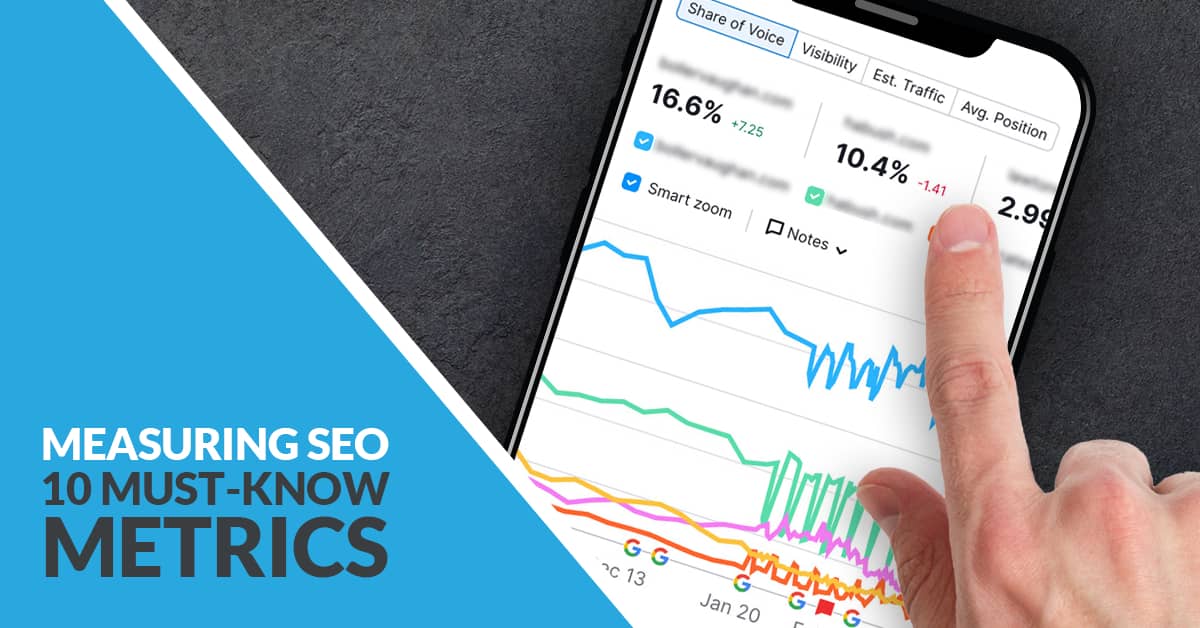How Do You Measure SEO?
10 Minute Read
Most businesses entrust their search engine optimization to a marketing agency. Considering the importance of SEO to your marketing, that’s a lot of trust. You need to have confidence that the agency is not only optimizing your website and online footprint, but measuring SEO correctly.
At Twelve Three Media, our SEO Experts have seen plenty of agencies fall down on both counts. It’s pretty easy to know when SEO marketing isn’t working—you’re not ranking, you don’t get traffic, and you’re not getting leads—but a lot of businesses don’t realize that their agency is also failing to measure SEO efforts.
Stop throwing good money after bad results. Below, we discuss the data agencies should provide to their clients so they can feel confident in their SEO investment.
Important Metrics for Measuring SEO
No one wants to know how the sausage is made, but everyone wants a delicious breakfast. That’s how it is with reporting on marketing and advertising. As a business owner, you probably don’t expect (or maybe even want to know) the gritty details of how your agency enhances your SEO. What you care about is that you’re getting results, and what that means for the bottom line.
We could write an exhaustive article on all the metrics that go into measuring SEO success. That’d prove our marketing acumen, but would it enhance your understanding of search engine optimization and what to demand from your agency? We certainly don’t think so.
Instead, let’s take a look at the measurements that matter most and explain why each one is important for gauging SEO success.
1. Keyword Rankings
Tracking keyword performance is the most fundamental component of measuring SEO. Your keyword list should include a range of competitive queries that encompass your products and services.
One of the first things people do when looking for something they need is pull up a search engine—usually Google. If you aren’t consistently ranking for your priority keywords, your digital marketing efforts as a whole are dead in the water.
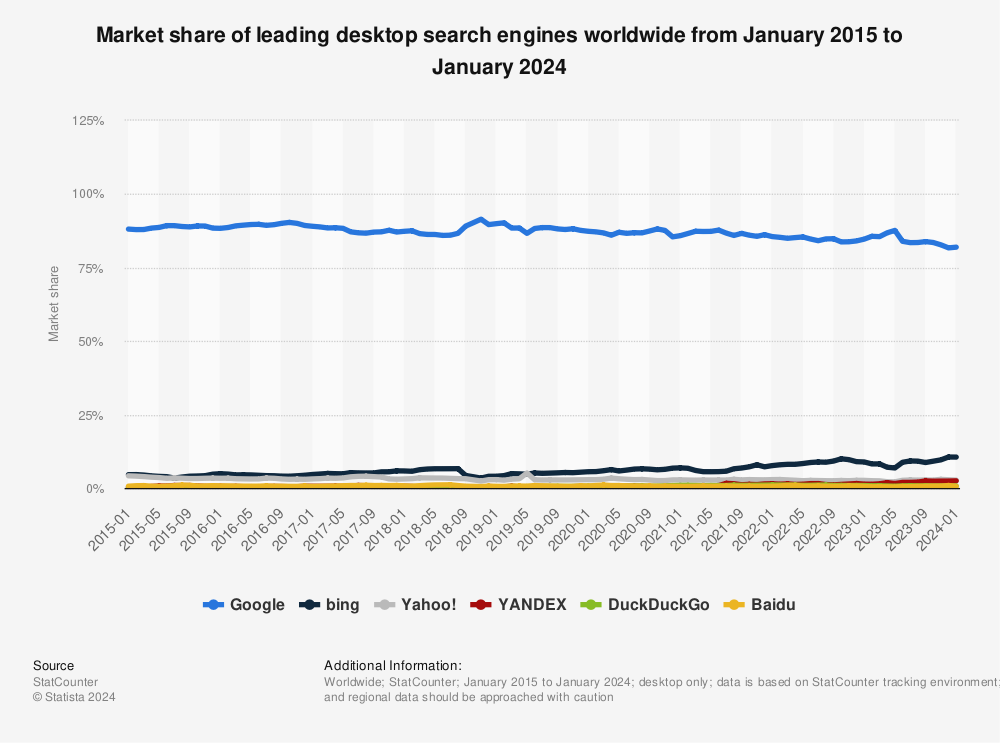
There are any number of free and premium options for tracking keyword rankings. Which one you choose matters less than setting up tracking and keeping an eye on how well your site performs.
Keyword rankings are in constant flux. Google makes tweaks throughout the day—every day—which can affect your website’s standing. There are also the major algorithm updates that can significantly impact your rankings in the short term before things stabilize.
It is important not to panic when this happens. More importantly, you shouldn’t treat your position in the Google SERPs as the most important part of your SEO strategy.
Read More: How Fixating on the Wrong Keywords Kills Your SEO Strategy
2. Organic Traffic
The ultimate goal when you invest in SEO is not to stand out on Google (although we all love those first-place and position zero rankings), Bing, or any other search engine. You want to rank on the first page of Google because it maximizes the likelihood that people will come to your website.
Organic search traffic is very easy to monitor. There is a dedicated report in Google Analytics that tells you how many people get to your website from online searches.
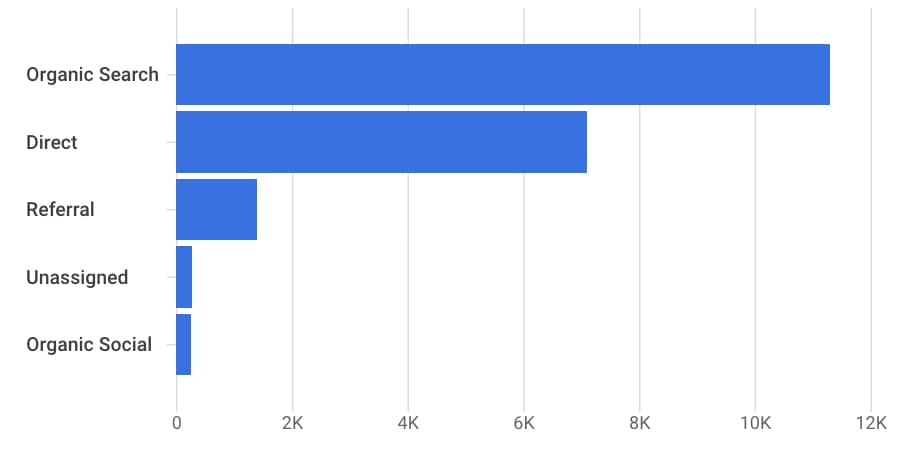
Where the rubber hits the road is when you (a) rank first for the most valuable keywords and (b) drive website traffic from those searches. Google will see you as an authority, which can drive more traffic—and, ideally, customers—to your business.
3. Qualified Traffic
No store is successful because they get a lot of window shoppers. Likewise, having a lot of people come to your website shouldn’t be treated as a goal in itself.
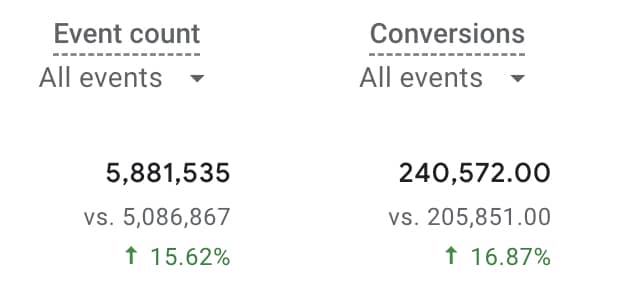
While measuring the traffic you get from SEO is key, the more important metric is how much qualified traffic you get to your website. Qualified traffic refers to users who take actions that align with your business goals. This may include:
- Making a purchase
- Calling or contacting you online
- Signing up to receive emails
- Watching a video to the end
- Downloading a whitepaper or other premium content
- Registering for an event
All aspects of marketing and advertising need to align with your business goals. This may include greater visibility, customer engagement, leads, and (ultimately) revenue. When it comes to SEO, qualified traffic is the best way to measure these success metrics.
Conversion Metrics: What Your Marketing Agency Isn’t Telling You Could Cost You Thousands!
4. Click-Through Rate
Click-through rate (CTR) measures the percentage of users who click on your link in the SERPs compared to the total number of users who see the result. In the context of search engine optimization, CTR is particularly important because it reflects how well a website’s listings or search results snippets are enticing users to click through to the website.
A higher CTR indicates that a website’s search listings are relevant and appealing to users, which can positively impact its organic search visibility. CTR can also provide insights into the effectiveness of keyword targeting and content relevance.
It is important to consider your website’s click-through rate in light of specific keywords and search queries. Low CTR suggests potential areas for improvement, such as title tag changes, meta description improvements, structured data implementation, and more.
5. Bounce Rate
Bounce rate refers to the percentage of visitors who leave a website after accessing just one page and without any kind of engagement. The debate about whether bounce rate is a ranking factor rages on, but there are some important takeaways from this metric:
- Search engines like Google aim to deliver the most relevant and useful results to users. If a high percentage of visitors quickly leave a page, it may signal to search engines that the content isn’t meeting user expectations.
- If a website is ranking for keywords that aren’t relevant to its content or target audience, visitors may land on the page and leave immediately—resulting in a high bounce rate. This can signal to search engines that the website may not be effectively targeting its intended audience or providing the right content to meet their needs.
- By analyzing bounce rate alongside other metrics, website owners and SEO professionals can gain insights into which pages are underperforming and take steps to optimize them for better engagement and retention. Potential areas of improvement include the website content, user experience, and overall optimization.
6. Engagement Rate
The engagement rate is the counterpart of the bounce rate. Instead of measuring the number of users who leave the site from the first page they access, engagement rate measures the visits with some form of meaningful engagement.

Google defines “engagement” as one of the following:
- A website session lasting a minimum of 10 seconds
- A session in which the user accesses 2 or more pages
- A session that results in a conversion
The more engaged sessions your website has, the more value visitors receive when they are on the site. Google interprets high engagement rates as signals of user satisfaction and content relevance, which can have a beneficial effect on your search rankings.
7. Page Speed & Site Speed
Multiple considerations go into building a professional website. It’s easy to focus on the bells and whistles and lose sight of what matters: connecting with the customer and serving their needs.
Websites with a lot of junk code, themes, and other elements run slow—especially on mobile. Not only does this turn customers off, but Google has made it clear that page speed is a ranking factor. PageSpeed Insights can tell you how fast your site loads across devices.
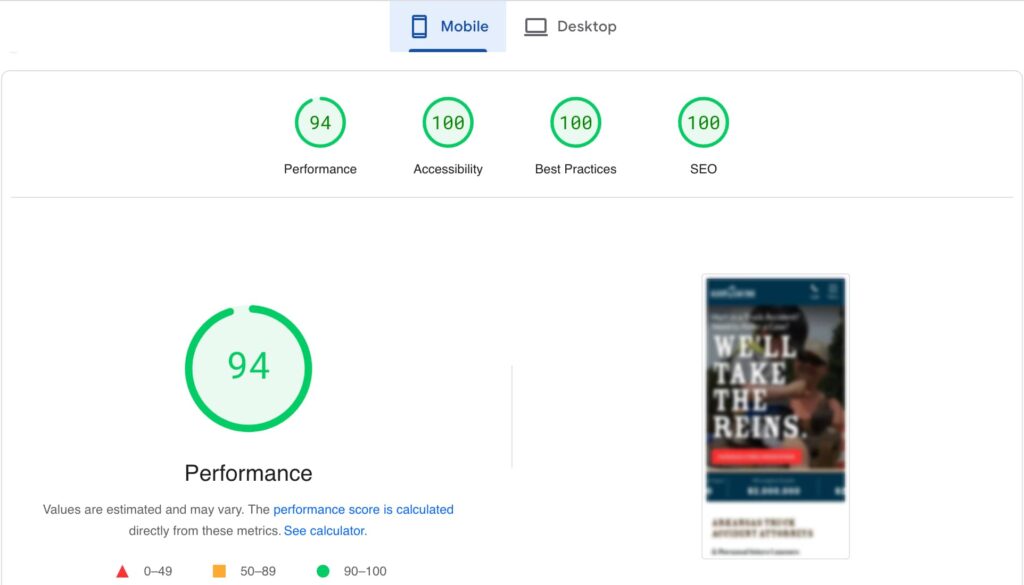
If a page on your website loads slowly, it is less likely to rank in the SERPs. The same is true for your site as a whole. Optimizing site speed needs to be a priority during website development, as it will affect your SEO (not to mention many other areas of your marketing).
Read More: Why Does Page Speed Matter?
8. Backlinks
A backlink is a hyperlink that directs users from one website to another. In the realm of SEO, backlinks play a crucial role in determining a website’s authority and credibility.
Essentially, search engines view backlinks as votes of confidence from one site to another. The more quality backlinks a website receives from reputable sources, the higher its perceived authority and trustworthiness in the eyes of search engines. This can make your site more visible to users searching for relevant topics or keywords.
Obtaining high-quality backlinks is a fundamental strategy for improving SEO performance and increasing organic traffic. You need to know that your agency is (a) building a strong backlink portfolio for you and (b) actively managing backlinks to ensure any low-quality links are removed.
Measuring backlinks is difficult without access to and knowledge of SEO tools. The best way to measure the positive impact of backlinks is to partner with a reputable agency.
9. Domain Authority
Domain authority measures the likelihood that a site will be included in search rankings. It’s calculated based on factors such as the quality and quantity of inbound links pointing to the site, as well as other SEO-related metrics.
The domain authority metric was created by Moz. Google doesn’t rely on it for search rankings, and other tools have developed their own means of measuring domain authority. Nevertheless, it’s worth knowing your domain’s authority so you can have a high-level understanding of the “trust” your website has earned.
You can check your domain authority for free on websites like Moz or Ahrefs. Correlating domain authority scores from several different ranking tools can give you a comprehensive picture of what sort of “authority” your site has. This will help you identify potential improvements to your SEO and opportunities to outrank the competition.
10. Clicks from Google Business Profile
Every business should have a claimed and optimized Google Business Profile. Without one, you’re basically telling Google that you don’t want to stand out in the local rankings.
Clicks are the most important SEO metric to track inside Google Business Profile. The more clicks your profile gets, the more people are finding your business through local search.
If your business profile isn’t standing out in the Local Pack, it’s time to think about how you can rank better and get more clicks. Optimizing fields inside Google Business Profile (such as integrating priority keywords in your business name, ensuring all relevant categories are selected, etc.) will improve your visibility among local customers and drive more leads.
What Affects SEO Performance?
Hundreds of different factors impact how and whether your site ranks. Search engine algorithms weigh both on-site and off-site signals, from the relevance and quality of the content to backlinks to website security to how long your website has been around.
There are countless articles summarizing the ranking factors used by Google and other major search engines. What matters most for businesses, however, is ensuring that they are set up for success in the SERPs.
Clients often come to us for help because their previous agency made a mess of their SEO. Some of the most common issues we see include:
- Bad content: Content can be “bad” for a number of reasons. It might be poorly written, superficial, outdated, employ bad SEO practices, duplicate the content found on other websites, and the list goes on. Your website will never rank if the pages aren’t authoritative and don’t include the necessary search signals.
- No keyword optimization: There is an art to writing for SEO without sacrificing content quality. Far too often, we see websites where little to no effort is made to optimize for keywords or send quality signals to the search engines.
- Lack of quality backlinks: You can purchase thousands of backlinks for very little money. Usually, though, these backlinks come from domains with low authority scores. Whether you have a bunch of low-quality backlinks or no backlink portfolio to speak of, your ability to rank in search will suffer.
- Poorly built website: One sign of a poorly built website is that it takes forever to load. It might also use too many resources or rely too much on themes. Both of these lead not only to a poor user experience but difficulty ranking for search terms.
- Not optimizing images: Image optimization is often overlooked. Visitors might see a pretty picture when they access your website, but search engine bots won’t know what they’re “looking at” if you don’t tell them. Alt text and captions are good ways to integrate search terms so bots can accurately identify images and view them as SEO assets on the page.
If you have these issues AND your agency isn’t measuring or reporting on SEO, your marketing efforts are in trouble. You need an agency committed to meeting your goals, providing you with accurate data, and ensuring a positive return on your investment in search marketing.
Is Your SEO Up to Snuff?
Before you can measure SEO properly, you need a website that is designed with online search and customer experience top of mind. Janky, poorly structured websites not only don’t rank—they drive potential customers away.
A trustworthy marketing agency will be able to tell you what’s wrong with your current website and recommend effective changes. They should also be able to measure your SEO performance and provide honest, meaningful data on successes and areas for improvement.
